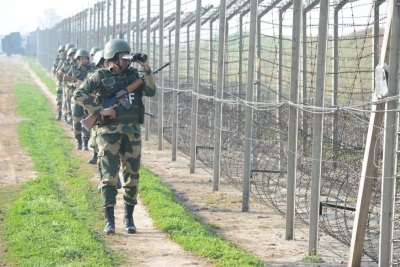Srinagar, (Samajweekly) In the past month, the newly appointed Director General of Police for Jammu and Kashmir, RR Swain, has emphasized the crucial need for coordinated efforts to dismantle terrorist networks, particularly the Over Ground Network, with the ultimate goal of putting an end to terrorism in the region.
During a joint security review meeting, he underscored the importance of utilizing modern technological tools to monitor the security situation and directed the launch of operations in the higher reaches to root out the terrorists hiding there.
Despite persistent efforts to deal with both the foreign and local terrorists in the higher reaches and to thwart their attempts to infiltrate during winter, the terrorists are devising new tactics to instigate terror in Kashmir. This has led to a resurgence of the disturbing trend of targeting Jammu and Kashmir police personnel. On October 29, Jammu and Kashmir police Inspector Mansoor Ahmad was shot while playing cricket at Eidgah, Srinagar.
Expressing condolences for the loss of Inspector Masroor Ahmad on December 7, DGP Swain stated, “The cowardly attack on a policeman, enjoying a moment of leisure, is a stark reminder of the vicious mindset perpetuated by terrorist networks operating at the behest of Pakistan.”
Apart from selectively targeting policemen, the terrorists, feeling the heat from the security forces in Kashmir, have shifted their activities to the south of Pir Panjal, leading to a revival of terrorism in the twin districts of Rajouri and Poonch.
In an encounter on November 23, two terrorists were killed in Dharmsal, Rajouri District, in Jammu and Kashmir. Five soldiers, including two officers, lost their lives in the operation launched by the security forces against the terrorists.
Among the terrorists killed was a high-ranking LeT terrorist who was a Pakistani national having received training on the Pakistan and Afghanistan front.
Even as incidents of terror in Jammu and Kashmir have shown an overall declining trend over the last six years, with 2023 registering all-time low numbers, the government maintains a policy of zero tolerance against terrorism.
The Ministry of Home Affairs (MHA) reports a 66 per cent decline in the killing of security personnel in J&K during encounters with terrorists between 2018 and 2022.
Minister of State for Home Affairs, Nityanand Rai, provided figures showing a decrease in terrorist-initiated incidents, encounters, civilian casualties, and security forces personnel casualties in 2023 compared to the previous years.
Due to the decline in terrorism, the region has witnessed a boost in tourism, recording around two crore tourist arrivals up to November in 2023, a significant increase compared to previous years. Union Tourism Minister G Kishen Reddy attributed this growth to Prime Minister Narendra Modi’s role in showcasing India’s tourism potential. Additionally, Union Home Minister Amit Shah predicted that Jammu and Kashmir would surpass two crore tourist arrivals.
However, while the graph of terrorism has come down, the question arises: Are the security agencies up to speed to counter the changing terrorist tactics?
The main challenge still lies in Pakistan-sponsored terrorism, with logistical support and drones coming in from across the border for arms smuggling. With elections likely before September 2024, the task before the security agencies is clear: Wipe out the remnants of terrorism in the UT and counter terrorist tactics effectively to ensure the maximum participation of the people in the electoral process.








